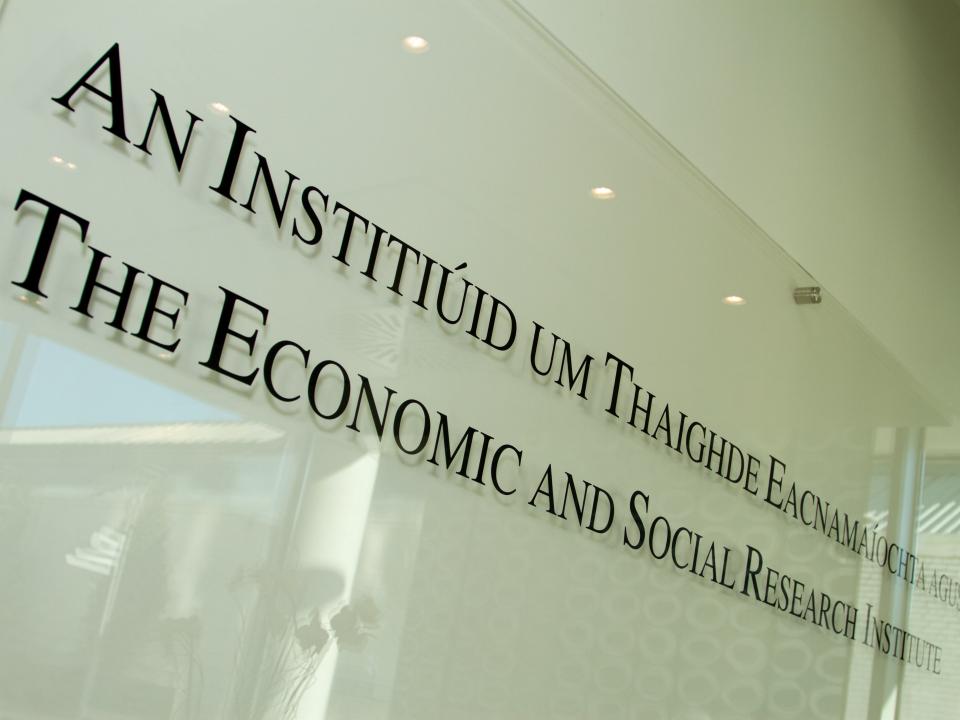ESRI Governance
What is the legal and governing status of the ESRI?

The Economic and Social Research Institute is a company limited by guarantee, incorporated in 1960 under the Companies Acts 1908-1959 and registered in Ireland under registration number 18269. The registered office is Whitaker Square, Sir John Rogerson’s Quay, Dublin 2. While the ESRI is a limited liability company it is exempted from the obligation to use the word “limited” as part of its name. It is a not-for-profit organisation and registered as a charity under registration number CHY5335.
The ESRI’s Memorandum and Articles of Association are here. These set out the rules for the organisation’s governance and management structure, in particular the role of members, the Council, and the Director.
The ESRI is a membership-based organisation which means that individuals and companies can support the organisation by becoming members. There are currently approx. 100 members of the Institute. The Council serves as the board of directors, elected by the membership base. More details on the Council are in the section below.
While established as a private sector entity, given the nature of the Institute’s funding (mainly from public sources), it is treated as a public body for the purposes of some legislation and complies with many of the provisions of the Code of Practice for the Governance of State Bodies.
The ESRI is audited by the Comptroller & Auditor General and is subject to the rules that apply to state organisations in relation to prompt payments, disclosure, risk management and tax clearance. Our most recent Annual Report and Financial Statements are available here.
ESRI Council

The Institute’s statutory ruling body is the ESRI Council, comprising up to 14 members including the Director (Alan Barrett) and Chairperson (Sean O'Driscoll). ESRI Council members are elected at the Institute’s AGM for a three-year term. They represent a cross-section of ESRI members: academia, civil services, state agencies, business, and civil society.
Current ESRI Council Members:
- Sean O'Driscoll, Chairperson
- Alan Barrett, Director
- Shay Cody, former General Secretary, Fórsa
- Katy Hayward, Professor of Political Sociology, QUB
- Thia Hennessy, Dean, Cork University Business School, UCC
- Brigid Laffan, Emeritus Professor, Robert Schuman Centre for Advanced Studies at the European University Institute
- Sandra McNally, Professor of Economics, University of Surrey
- Gabriel Makhlouf, Governor, Central Bank of Ireland
- David Moloney, Secretary-General of the Department of Public Expenditure and Reform
- Anne O'Leary, Vice President Mid Market EMEA and Head of Ireland Meta
- Ciarán Ó hÓgartaigh, former President, University of Galway
-
Anne Vaughan, former Deputy Secretary General of the Department of Social Protection and former Chair of the National Statistics Board
The Institute enjoys full academic independence and is answerable ultimately to its subscribing members, currently approximately 100 companies and individuals. The Council is the effective board of directors of the Institute. Council meetings are attended by the Company Secretary and two representatives of the Management Committee in a non-voting capacity. Apart from the Director of the Institute, who is an ex-officio member, ESRI Council members are not remunerated.
The ESRI Council’s Code of Conduct is available here.
Independence

The ESRI is Ireland’s leading not-for-profit economic and social policy research institute. We are fully independent and our work is free of any expressed ideology or political position.
The ESRI’s independence and objectivity is based on the quality of its research and the requirement for reports to meet high academic standards through peer review.
The ESRI is committed to publishing all research reaching the appropriate academic standard, irrespective of its findings or who funds the research. ESRI research is thus open to public scrutiny.
From its foundation in 1960, the Institute’s role has been to provide a strong, independent source of research evidence for policy and civil society in Ireland. Its mandate was that it would be funded by government and yet independent of government. This independence means that researchers have no fear of publishing research findings that do not provide support for government policy. Great care was taken to protect the Institute’s independence in setting up and revising the Institute’s governance structures over the years. Independence, objectivity and excellence remain core values of the ESRI and its researchers.
Corporate Governance Policies

The Institute’s procedure for investigating allegations of scientific misconduct
The Institute’s Child Safeguarding Statement (Research)
The Institute’s Child Safeguarding Statement (Corporate)
The Institute’s Employee Code of Business Conduct
The Institute’s Customer Charter
Office of the Ombudsman: Under the terms of the Ombudsman (Amendment) Act 2012, the ESRI is subject to independent oversight by the Office of the Ombudsman, who examine complaints from people who feel they have been unfairly treated by a public service provider in Ireland. If you should have any such complaint, in the first instance you should contact the Institute at admin@esri.ie and we will endeavour to resolve the issue as soon as possible. If you are unhappy with the outcome, you can refer your complaint to the Ombudsman as instructed on their website: https://www.ombudsman.ie/
Ombudsman for Children: The Institute also comes under the remit of the Ombudsman for Children. If you are a child or young person under 18 or an adult who knows a child whom you feel has been unfairly treated through any interactions with the ESRI, complaints can be directed to admin@esri.ie and we will endeavour to resolve the issue as soon as possible. If you are not satisfied with our decision on your complaint, you can refer the matter to the Ombudsman for Children’s Office at: Ombudsman for Children’s Office, 52-56 Great Strand St, Dublin 1. Free Phone: 1800 20 20 40 or at www.oco.ie or email ococompliant@oco.ie
Accessibility: As a company limited by guarantee, the provisions of the Code of Practice on Accessibility of Public Services do not directly apply to the Institute. However the Institute complies with all relevant Health and Safety legislation, is committed to achieving the highest possible standards of accessibility and is implementing the provisions of the Code as appropriate.
The Institute has an Access Officer whose role is to co-ordinate the provision of assistance and guidance to persons with disabilities in accessing our services. The contact details for the Access Officer are: Hugh Nolan, ESRI, Whitaker Square, Sir John Rogerson’s Quay, Dublin 2. Tel: 01 863 2123. Email: accessofficer@esri.ie (all other queries should be emailed to admin@esri.ie).
Note on ESRI Building Accessibility: The ESRI building is in Whitaker Square, a pedestrian-only square off Sir John Rogerson’s Quay and Cardiff Lane. Access ramps to Whitaker Square are located at the entrance to Whitaker Square from Sir John Rogerson’s Quay and from Cardiff Lane. The Hanover Street East entrance has street-level access. The ESRI’s main door is located in Whitaker Square at ground floor level. The ESRI also has a disabled parking spot, located in the underground car park.
Irish Human Rights and Equality Commission Act 2014: The Institute is committed to the implementation of policies and actions which are consistent with the duties conferred on public bodies by the Irish Human Rights and Equality Commission Act 2014. The Institute’s work in this area was recognised when it was awarded the Athena Swan Bronze award in November 2023. This quality charter accreditation scheme is underpinned by a framework for higher education and research institutes to implement impactful and sustainable gender equality work and to build capacity for evidence-based equality work across the equality grounds enshrined in Irish legislation.
Official Languages Act 2003: The Institute complies with the Official Languages Act 2003 where possible. Such compliance includes 5% of the advertising spend being allocated to Irish language media, 20% of advertising content in Irish and the availability of key corporate reports in both English and Irish. The Institute’s Head of Governance and Corporate Resources is the Irish Language Officer. Email: ATO@esri.ie.
Protected Disclosures Act: There were no protected disclosures made to the ESRI, or to other relevant bodies in relation to the ESRI, in 2024. The ESRI is committed to upholding the highest standards of transparency, integrity, and accountability. We support and comply with the provisions of the Protected Disclosures Act. To ensure compliance with the Act, we have put in place a policy and procedures that outline the process for making protected disclosures, either through designated internal channels or via external channels as prescribed by the legislation. A copy of the ESRI's Annual Protected Disclosure Report is available here.
ESRI Climate Action Roadmap 2024: The ESRI is committed to reducing our environmental impact and demonstrating our responsibility as a sustainable organisation. The Roadmap outlines how we aim to meet the requirements of the Climate Action Mandate 2024 and recognises the legal requirements.